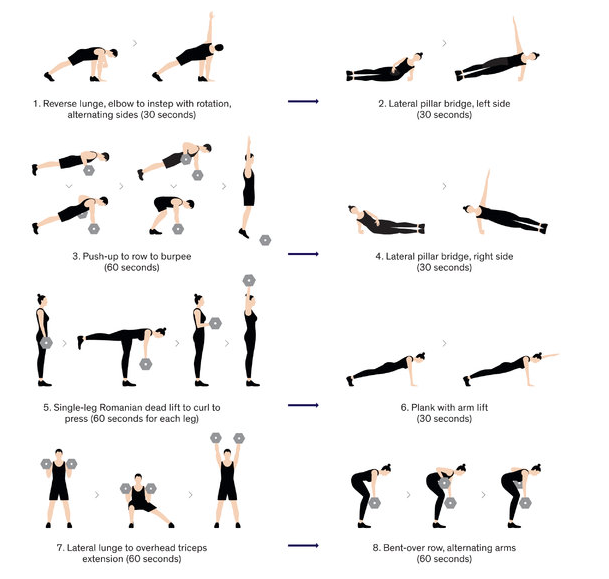The advanced 7-minute workout
Christmas is over and you probably ate too much and sat on your ass all day having bad thoughts about your in-laws , so I think it is the perfect time to post another fantastic workout piece from the New York Times .
I posted The Seven Minute Workout a while back and it is the post that gets the most traffic every day . As I also just published the perfect porkbelly recipe , I think this workout follow-up makes sense : New Year’s resolution wish list ?
Here is the article posted in full :
Ever since the magazine published the Scientific 7-Minute Workout in May last year, readers have been writing and tweeting their requests for an updated, more advanced version. For them, the workout became too easy or humdrum, as tends to happen when exercises are repeated without variation. So here it is: a new, more technically demanding regimen, one that requires a couple of dumbbells but still takes only seven minutes.
To come up with the workout, I turned to Mark Verstegen, the founder and president of the Phoenix-based EXOS, a company that focuses on health and athletic performance. He and his colleagues train, among others, N.F.L. players and the German national soccer team, which won the World Cup this year. EXOS also develops in-house fitness and nutritional programs for corporations, so Mr. Verstegen has experience working with those of us who don’t already have bowling-ball biceps and vast reservoirs of endurance and gritty resolve. He and his colleagues, Mr. Verstegen says, know how difficult it can be to find the time and motivation to work out as often as we know we should. Hence a routine that can be completed in just minutes and without much space — no more than a hotel room or an office, for example.
Taken together, the exercises stress and strengthen muscle groups throughout the upper body, lower body and torso. The full workout (see step-by-step instructions below) also provides a compressed but intense interval-style endurance workout. Anyone who completes multiple push-up-to-row-to-burpee movements in 60 seconds (Exercise 3) will raise his or her heart rate substantially. The subsequent 30 seconds of side bridges (Exercise 4) provide a brief aerobic respite before the aerobically demanding Exercise 5 (single-leg Romanian dead lift to curl to press).
Go to nytimes.com/7-minute-workout on your phone to try our new Web application.
There’s a lot of scientific support for the benefits of this sort of high-intensity interval training. In recent months, articles have reported that even a few minutes of interval-style exercise increase endurance, squelch appetite and improve metabolic and cardiovascular health in sedentary adults more effectively than traditional prolonged-endurance exercise. In other words, seven minutes or so of relatively punishing training may produce greater gains than an hour or more of gentler exercise. What’s more, study subjects who did a combination of prolonged exercises (like running or cycling) and high-intensity interval workouts typically reported preferring the intervals.
Interval programs based on cycling, walking and running come with a downside, however: They improve overall fitness and health but do little to improve muscular strength other than in the legs. By contrast, the New Scientific 7-Minute Workout does more than build the large, obvious muscles that most of us can name-check, as Mr. Verstegen puts it — the quads and glutes, for example; its exercises also engage smaller, often overlooked muscles in the back, abdomen, shoulders and hips that, when neglected and weak, contribute to back, neck and knee pain.
The workout should combat a desk job’s “aches, pain and fatigue,” Mr. Verstegen says, as well as teach “clean and efficient movement patterns,” even to those of us who tend to be clumsy. The exercises demand precision and, over time, should instill graceful, athletic coordination. Done correctly, they should make you healthier, stronger, less prone to injury and athletically more capable.
As a whole, the routine is also “extremely scalable,” Mr. Verstegen says. People who are out of shape today may be able to complete only one or two reverse lunges with rotation during the 30 seconds of Exercise 1. But after several weeks of practice, they may be able to perform five or more repetitions, he says, and can continue to intensify the routine’s physical demands by adding as many repetitions as possible in the time allotted.
It should be noted that the 7-Minute Workouts, the original and the advanced versions, are not meant to be your sole exercise. “Any routine, if that’s all you do, will become monotonous and demotivating,” Mr. Verstegen says. So mix up your workouts. Perhaps alternate the old and the new seven-minute regimens over days or weeks. Go for a run at lunch. Join an over-40 rugby league. Buy a bike or a Speedo — use them together in a triathlon.
“The idea is to develop a relationship and routine with your body,” Mr. Verstegen says, “so that it feels strong and healthy and you feel energized and excited to be up and moving.”
The New York Times is now offering a free mobile app for the popular Scientific 7-Minute Workout and the new Advanced 7-Minute Workout.
The app offers a step-by-step guide to both 7-minute workouts, offering animated illustrations of the exercises, as well as a timer and audio cues to help you get the most out of your seven minutes.
Step-by-Step Instructions for the Advanced 7-Minute Workout

1. Reverse Lunge, Elbow to Instep With Rotation, Alternating Sides (30 seconds)
- Extend right leg behind you, with left knee bent and right hand on ground (the reverse lunge).
- Bend left arm and bring inside front (left) knee, then raise and point right arm and chest skyward. (rotation).
- Place both hands on ground while straightening both legs and flexing ankles; return to standing position.
- Repeat with left leg and right arm. Repeat.

2. Lateral Pillar Bridge, Left Side (30 seconds)
- Lie on left side. Lift side off ground.
- Point right arm toward sky.

3. Push-Up to Row to Burpee (60 seconds)
- Position self over both dumbbells, legs extended back. Do a push-up.
- Lift and lower right dumbbell, then left dumbbell (as if rowing).
- Rapidly pull legs forward. Release dumbbells.
- Jump forcefully upward (completing a Burpee).

4. Lateral Pillar Bridge, Right Side (30 seconds)
- Lie on right side. Lift side off ground.
- Point left arm toward sky.

5a. Single-Leg Romanian Dead Lift to Curl to Press, Left Side (60 seconds)
- Hold dumbbells at hips.
- Lean forward, balancing on left leg while extending right leg back (the Romanian dead lift).
- Return to start position.
- Curl dumbbells toward chest (the Curl).
- Raise both dumbbells over head (the Press).
- Lower weights to chest.
- Lower weights to hips and resume starting position. Repeat.
5b. Single-Leg Romanian Dead Lift to Curl to Press, Right Side (60 seconds)
- Hold dumbbells at hips.
- Lean forward, balancing on right leg while extending left leg back (the Romanian deadlift).
- Return to start position.
- Curl dumbbells toward chest (the Curl).
- Raise both dumbbells over head (the Press).
- Lower weights to chest.
- Lower weights to hips and resume starting position. Repeat.

6. Plank With Arm Lift (30 seconds)
- Assume push-up position (also known as The Plank).
- Lift one arm in front of you. Lower. Lift other arm. Repeat rapidly.

7. Lateral Lunge to Overhead Triceps Extension (60 seconds)
- Stand straight, holding dumbbells at shoulder height.
- Take big step to right side, bending right knee while keeping left leg straight (a Lateral Lunge). Return to upright.
- Lift dumbbells over head. Lower them back toward shoulder. Step to other side. Repeat.

8. Bent-Over Row (60 seconds)
- Holding dumbbells, lean forward, knees bent, back straight.
- Lift one dumbbell until it reaches chest height (as if rowing). Lower.
- Lift dumbbell on other side and lower. Repeat on each side while maintaining bent-over position.
A version of this article appeared in the Oct. 26 issue of The New York Times Magazine.




